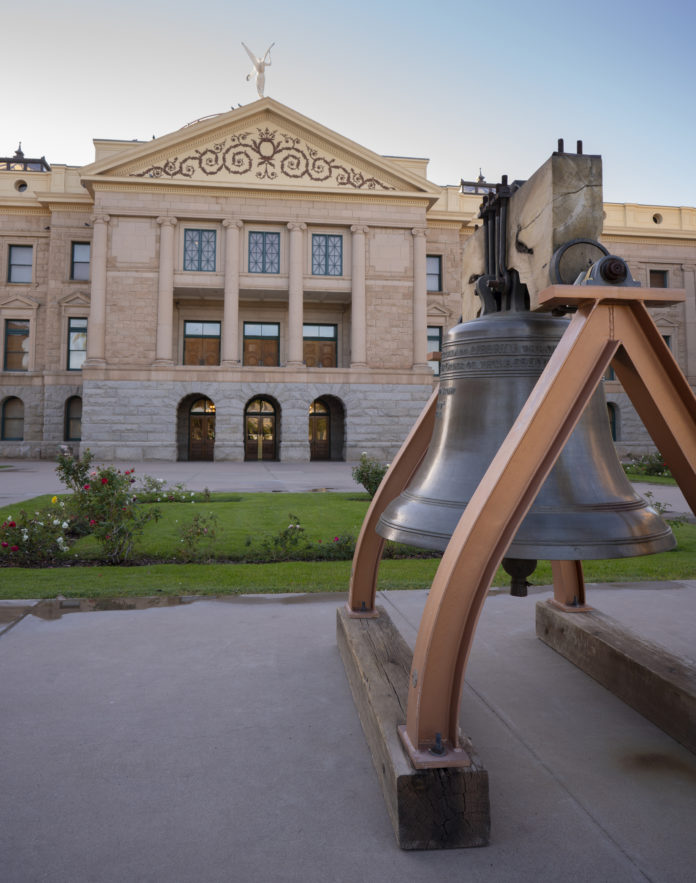Angered by House Democrats failing to show up to work earlier in the week to vote on a state budget, Republicans on Thursday limited debate as they prepared to push through a Senate-approved plan that slashes income taxes and contains a conservative wish list of policy changes.
House Speaker Rusty Bowers announced that the majority party would change the rules and allow only 30 minutes of debate on each of the 11 budget bills. Such debate typically takes up hours on each bill.
“It is clear, was clear then, by the absence of an entire caucus … that procedural obstruction and delay have been instituted in lieu of civility,” Bowers said. “So we are by this motion allowing clear opportunity to present pros and cons on collective and individual decisions and issues but not the abuse of health concerns and time restraints that could put people at risk.”
“It is clear, was clear then, by the absence of an entire caucus … that procedural obstruction and delay have been instituted in lieu of civility,” Bowers said.
The rule change still allows “clear opportunity to present pros and cons,” he said.
With the rules changed, the House sped along and debated and passed the first bill by 1 p.m., a $1.9 billion tax cut along party lines.
Republicans say the state is flush with cash, and the tax cut is needed to keep Arizona competitive and prevent the tax increase contained in Proposition 208, which adds a new 3.5% tax on high-earning Arizonans. They argued it will help businesses create jobs and that will help the middle class.
“I think what we do have here is a historic tax cut that will result in significant positive impact for everyone, everyone in the state,” said Peoria Rep. Ben Toma, the majority leader and a key architect of the tax cuts. “It’s a tax cut that helps small businesses, and it helps us be more competitive as a state relative to our neighbors.”
Democrats vehemently oppose the plan, saying without it the state could finally fully fund schools and social programs that were never fully restored after the Great Recession.
“This is the time to make meaningful investments in our state’s future instead of this massive giveaway to folks who are really not struggling,” Democratic Rep. Kelli Butler of Paradise Valley said. ”And there are plenty in Arizona who are really struggling.”
When fully phased in, the plan would lower tax rates for most taxpayers to 2.5%, down from a range of 2.59% to 4.5%. Wealthy taxpayers would, in effect, be spared from the tax hike approved by voters last year to pay for schools.
The average Arizonan earning between $75,000 and $100,000 will save $231 a year in state income taxes, while a taxpayer earning between $500,000 and $1 million a year will save more than $12,000, according to the Legislature’s budget analysts.
The new rules eliminate most of the usual debate, questions, and forced roll call votes on amendments that can eat up hours of time. Holding 29 of 60 seats, Democrats’ only power is to slow the movement of bills by extensive debate.
Democrats were enraged, saying they did not show up on Tuesday because Republicans had introduced a slew of last-minute amendments to the $12.8 billion budget plan that they hadn’t had time to review, and noted that it was absent Republicans who prevented a quorum.
Rep. Charlene Fernandez of Yuma said Republicans wasted 26 days of the session as they tried to get their own members on board with the budget deal they had had negotiated with GOP Gov. Doug Ducey.
“This is absolutely ridiculous to limit us,” Fernandez said, “Our public is asking for us to explain our votes. Our public is asking us to explain to them what these bills mean.”
Rep. Travis Grantham of Gilbert, the GOP speaker pro tem, said he worked with other leaders to craft the rule changes.
“We are not preventing members from debating,” Grantham said. “What we are preventing today is a endless obstruction that would ultimately result in a shutdown of the state of Arizona.”
Lawmakers face a June 30 deadline to pass a budget for the coming fiscal year.
The Senate packed the budget with conservative policy priorities, including a big expansion of the state’s private school voucher program, a ban on teaching so-called “critical race theory” in K-12 schools, and a host of items targeting enforcement of coronavirus restrictions.
It also embraces the unfounded theory that former President Donald Trump lost in Arizona because of voter fraud, creating a $12 million election integrity fund to pay for election security updates and future hand recounts and lays out a series of new election security procedures.
While Republicans appear to have the votes to pass the overall budget, some of the items added by the Senate could end up being dropped by the House.
Republished with the permission of the Associated Press.














